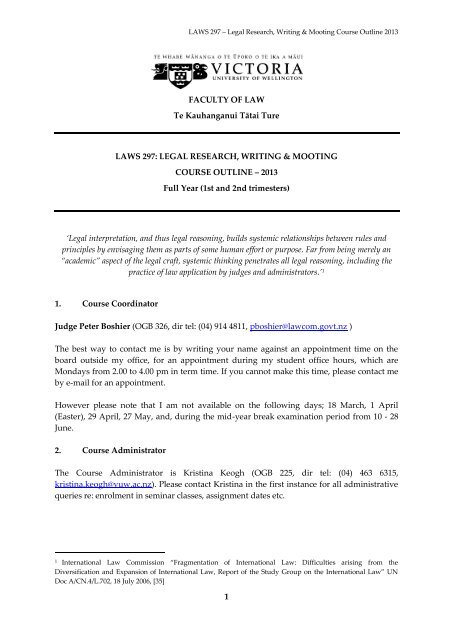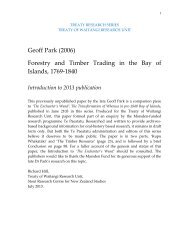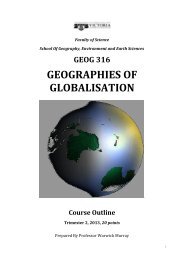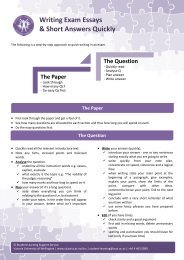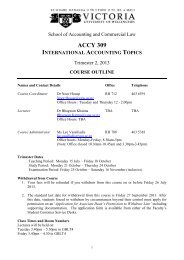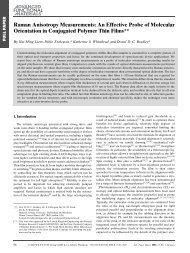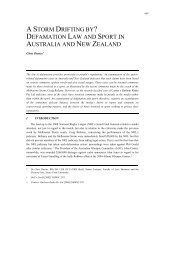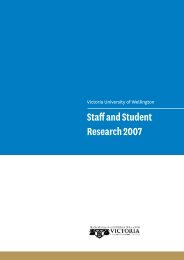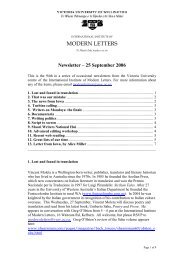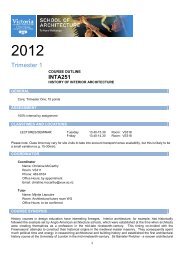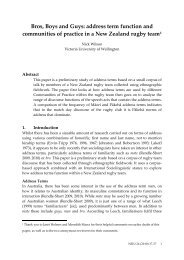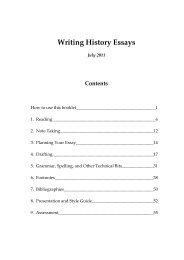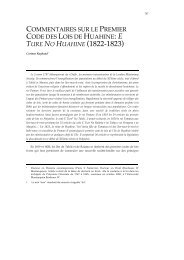1 FACULTY OF LAW Te Kauhanganui Tātai Ture LAWS 297: LEGAL ...
1 FACULTY OF LAW Te Kauhanganui Tātai Ture LAWS 297: LEGAL ...
1 FACULTY OF LAW Te Kauhanganui Tātai Ture LAWS 297: LEGAL ...
Create successful ePaper yourself
Turn your PDF publications into a flip-book with our unique Google optimized e-Paper software.
<strong>LAW</strong>S <strong>297</strong> – Legal Research, Writing & Mooting Course Outline 2013<br />
<strong>FACULTY</strong> <strong>OF</strong> <strong>LAW</strong><br />
<strong>Te</strong> <strong>Kauhanganui</strong> <strong>Tātai</strong> <strong>Ture</strong><br />
<strong>LAW</strong>S <strong>297</strong>: <strong>LEGAL</strong> RESEARCH, WRITING & MOOTING<br />
COURSE OUTLINE – 2013<br />
Full Year (1st and 2nd trimesters)<br />
‘Legal interpretation, and thus legal reasoning, builds systemic relationships between rules and<br />
principles by envisaging them as parts of some human effort or purpose. Far from being merely an<br />
‚academic‛ aspect of the legal craft, systemic thinking penetrates all legal reasoning, including the<br />
practice of law application by judges and administrators.’ 1<br />
1. Course Coordinator<br />
Judge Peter Boshier (OGB 326, dir tel: (04) 914 4811, pboshier@lawcom.govt.nz )<br />
The best way to contact me is by writing your name against an appointment time on the<br />
board outside my office, for an appointment during my student office hours, which are<br />
Mondays from 2.00 to 4.00 pm in term time. If you cannot make this time, please contact me<br />
by e-mail for an appointment.<br />
However please note that I am not available on the following days; 18 March, 1 April<br />
(Easter), 29 April, 27 May, and, during the mid-year break examination period from 10 - 28<br />
June.<br />
2. Course Administrator<br />
The Course Administrator is Kristina Keogh (OGB 225, dir tel: (04) 463 6315,<br />
kristina.keogh@vuw.ac.nz). Please contact Kristina in the first instance for all administrative<br />
queries re: enrolment in seminar classes, assignment dates etc.<br />
1 International Law Commission “Fragmentation of International Law: Difficulties arising from the<br />
Diversification and Expansion of International Law, Report of the Study Group on the International Law” UN<br />
Doc A/CN.4/L.702, 18 July 2006, [35]<br />
1
3. Time and Place of Classes<br />
(a) Lectures<br />
<strong>LAW</strong>S <strong>297</strong> – Legal Research, Writing & Mooting Course Outline 2013<br />
The class meets as a whole for lectures for the first half of both T1 and T2 in RHLT1. The<br />
dates for these lectures are as follows:<br />
Trimester 1<br />
Monday 4 March 5.40 – 6.30pm<br />
Monday 11 March 5.40 – 6.30pm<br />
Monday 18 March 5.40 – 6.30pm Presented by Professor Campbell McLachlan QC<br />
Monday 25 March 5.40 – 6.30pm<br />
Monday 1 April 5.40 – 6.30pm<br />
Monday 8 April 5.40 – 6.30pm<br />
Monday 15 April 5.40 – 6.30pm<br />
Trimester 2<br />
Monday 15 July 5.40 – 6.30pm<br />
Monday 22 July 5.40 – 6.30pm<br />
Monday 19 July 5.40 – 6.30pm<br />
(b) Seminars<br />
The course of study in legal research and writing will take place primarily through a series<br />
of seminars, offered in groups of approximately 15 students, in which students will learn<br />
and practise the skills of legal research, reasoning, writing and advocacy. Each student will<br />
need to enrol in a seminar group. Each seminar group will meet 14 times – 10 times in T1<br />
and six times in the first half of T2. A detailed programme of classes is set out on the<br />
attached Syllabus.<br />
Enrolment for LRW classes will be done on-line through the S-cubed system. Enrolment<br />
into seminar groups will open on Monday 25 February 2013 at 9am and will close on<br />
Tuesday 5 March at noon. Full details of how to enrol including the time enrolments open<br />
can be found on Blackboard.<br />
The course administrator reserves the right to reallocate students if that is necessary to<br />
ensure all students are allocated a class that they can reasonably be expected to attend.<br />
(i) Tutors<br />
Each class will have an academic tutor, who will be your principal point of contact for the<br />
course. There are ten tutors in total, and they are all experts in legal research and writing.<br />
2
Their names and contact details are:<br />
Nick Chapman (head tutor)<br />
Tai Ahu<br />
David Bullock<br />
Elizabeth Chan<br />
Maria Hook<br />
Sarah Jacobs<br />
Andrew King<br />
Sophie Klinger<br />
Mihiata Pirini<br />
Genevieve Taylor<br />
Benedict Tompkins<br />
<strong>LAW</strong>S <strong>297</strong> – Legal Research, Writing & Mooting Course Outline 2013<br />
nickchapman_nz@hotmail.com<br />
tai.ahu@vuw.ac.nz<br />
davidacbullock@gmail.com<br />
eht.chan@gmail.com<br />
maria.hook@vuw.ac.nz<br />
sarah.jacobs@justice.govt.nz<br />
andykingnz@gmail.com<br />
smklinger@gmail.com<br />
mihiatapirini@gmail.com<br />
genevievemtaylor@gmail.com<br />
benedict.tompkins@gmail.com<br />
In T1, each class will also receive special classes offered by specialist tutors in law library<br />
skills.<br />
(ii) Place of Classes<br />
All classes will be held in OGB 136, which is on the first floor of the Law Library.<br />
The two EXCEPTIONS are:<br />
(1) The online materials session in Week 3 (week beginning 18 March) will be in the<br />
computer lab, OGB GO1.<br />
(2) The training session run by trainers for LexisNexis and Thomson during March. Details<br />
will be provided through the S-cubed system. Please note that these sessions are in addition<br />
to your regular seminars.<br />
(iii) Syllabus of Classes<br />
A detailed syllabus for the course will be handed out with this Outline and posted on<br />
Blackboard.<br />
Classes will run throughout T1 and the first half of T2. They will conclude by Friday 23<br />
August 2013.<br />
3
4. Course Content<br />
<strong>LAW</strong>S <strong>297</strong> – Legal Research, Writing & Mooting Course Outline 2013<br />
Effective legal study is not primarily about mastering the content of specific legal rules –<br />
despite the fact that your law degree consists of numerous courses, which, by their title and<br />
description, look as though they are about the legal rules which govern particular areas of<br />
human behaviour or activity. In fact, the content of the particular applicable legal rules<br />
changes all the time. The study of law in a university is therefore more about the overall<br />
architecture of the law and the dynamics of the way in which it operates and is applied.<br />
Therefore, the most important things you need in order to equip you for the study of the<br />
law, and for its practice (however you may choose to use your law degree), are the basic<br />
specialist skills of legal reasoning and analysis, legal research, legal writing and advocacy<br />
(or the art of argument). They are the key to successful study and good results at Law<br />
School. They are also the most enduring thing that you will take away with you when you<br />
leave Law School. They are unique to the study of law. Success in other subjects does not<br />
necessarily prepare you for what you need to master the study of law.<br />
This course offers you the opportunity to begin the process of learning these essential<br />
survival skills of the lawyer’s craft in earnest. The course thus offers an introduction to the<br />
four core skills of:<br />
(a) Legal Reasoning<br />
(b) Legal Research<br />
(c) Legal Writing; and,<br />
(d) Advocacy.<br />
It develops those skills primarily through practice:<br />
in analysing a legal problem through assessment of opposing arguments;<br />
in using the Law Library as your laboratory to enable you to find the authoritative<br />
legal sources relevant to your problem (which will be a combination of print and<br />
electronic sources);<br />
in writing with the clarity and precision required of the lawyer (and correctly citing<br />
the authorities upon which you rely); and,<br />
in advancing legal arguments before a tribunal – both in written and oral form.<br />
Since the course is skills-based, it will be taught through the use of assigned legal problems,<br />
which may be drawn from different areas of law. As an introductory course, it will focus on<br />
the law of New Zealand–both legislation and the common law of New Zealand (as<br />
expounded by the judges both here and, as applicable, in other relevant common law<br />
jurisdictions). The problems will be structured for second year study. This means that they<br />
will be more challenging than first year law, but will not presume prior specialist knowledge<br />
of law in any particular area. They will require you to go and find out about the law relevant<br />
to the problem. That is part of the point of the exercise! You will find that the skills which<br />
you learn on this course are ones which you can and will continue to develop throughout<br />
the rest of your studies at Law School.<br />
4
5. Course Objectives<br />
At the conclusion of the course, students should be able to:<br />
<strong>LAW</strong>S <strong>297</strong> – Legal Research, Writing & Mooting Course Outline 2013<br />
understand and apply the basic constituent elements of effective analysis of a legal<br />
problem, using a structured methodology of identification of the issues and use of<br />
legal argumentation to resolve them;<br />
competently and independently identify the process needed to research the law<br />
relating to the relevant issues, and carry out that process, using both paper and<br />
electronic research tools;<br />
learn to record and expound the results of your research and analysis in clear, legal<br />
form, practising in particular the core task of writing an effective legal opinion<br />
(which is written, and supported by citation, in correct legal style): identifying the<br />
specific issues, analysing the law applicable to those issues; and evaluating the<br />
application of the law to the facts of the case so as to be able to reach a reasoned<br />
conclusion;<br />
present a correct and effective legal argument (in written and oral form) in a Moot<br />
Court.<br />
6. Mandatory Course Requirements (<strong>Te</strong>rms)<br />
(a) Attendance<br />
(1) Since the primary mode of delivery of this course is through seminars, in order to be<br />
granted terms, you must attend them. If you are unable to attend your nominated seminar in<br />
any particular week, it is your responsibility to inform your tutor in advance and seek<br />
permission to be excused (or to attend an alternative class). If you do not seek permission in<br />
advance, your absence will generally only be excused for illness (on production to the<br />
Course Administrator of a valid doctor’s certificate) or bereavement. Five per cent of your<br />
final mark will be awarded for participation in seminars. Participation does not mean simply<br />
attending. It requires you to be seen to have prepared for and taken an active role in the<br />
seminar.<br />
(2) Appearance in the Moot Court is mandatory, and cannot be excused for any reason. In<br />
the event that a student is precluded by illness or other extraordinary event from appearing<br />
in the Moot Court at the nominated time, he or she will be expected to attend on the nearest<br />
practicable date set by the tutor.<br />
Students who miss more than three seminars will fail terms.<br />
(b) Completion of prescribed non-assessable assignments<br />
All students must complete the following four exercises within the prescribed time. These<br />
three pieces of work do not earn marks but a failure to complete them will mean that you<br />
will fail terms. The dates by which each piece of work must be completed will be detailed in<br />
the Syllabus of Classes and on Blackboard.<br />
5
<strong>LAW</strong>S <strong>297</strong> – Legal Research, Writing & Mooting Course Outline 2013<br />
(1) The on-line library training homework<br />
(2) The two library training sessions provided by LexisNexis and Thomson trainers (you<br />
will be advised on where to sign up for these courses)<br />
(3) A short on-line citation exercise<br />
(4) The advocacy report (in semester 2)<br />
(5) Completion of prescribed assignments<br />
Students are expected to complete and hand in each of the prescribed assignments for this<br />
course (see next section below).<br />
7. Assessment<br />
The prescribed assessment for this course consists of 5 components:<br />
(1) Participation in seminars 5%<br />
(2) Legal writing exercise 1 15%<br />
(3) Legal writing exercise 2 (Opinion on prescribed materials) 20%<br />
(4) Legal writing exercise 3 (Research Opinion) 30%<br />
(5) Advocacy: (a) Written submissions 15%<br />
(b) Oral submissions 15%<br />
____<br />
Total 100%<br />
In order to give you an indication of your performance, you will receive marks for each of<br />
items (2) and (3) [35% of the total marks for the course] on the dates stipulated in the Course<br />
Syllabus. Your final mark for the course as a whole will be awarded at the conclusion of the<br />
course.<br />
6
8. Assignments<br />
(a) Submission of assignments<br />
<strong>LAW</strong>S <strong>297</strong> – Legal Research, Writing & Mooting Course Outline 2013<br />
All assignments are to be submitted by noon on the date stipulated in the Course Syllabus in<br />
both (a) hard copy and (b) electronic form through the Blackboard site. The hard copy will<br />
be treated as authoritative for time of delivery purposes.<br />
You must attach a duly completed cover sheet to the front of the assignment (which may be<br />
obtained from the Assignments Room OGB GO9A. You must file your assignment in the<br />
correct assignment box in GO9A for your seminar group. Please contact Kristina Keogh,<br />
Course Administrator, in case of difficulty.<br />
Due dates and times for assignments<br />
All assignments carrying marks are due at noon on the specified date.<br />
Date due Assignment name Word Limit Marks<br />
4 – 15 March LexisNexis and Thomson training sessions<br />
Thursday 4 April Library exercise<br />
Friday 12 April Citation exercise<br />
Friday 19 April Legal writing exercise 1 1000 15%<br />
Friday 24 May Legal writing exercise 2 1000 20%<br />
Monday 15 July Legal writing exercise 3 1500 30%<br />
Friday 19 July Advocacy Report n/a<br />
Thursday 8 August Written submissions 1000 15%<br />
Moots are held over the<br />
two week period<br />
starting 12 August<br />
Case or other references in the text are included in the word count. Footnotes that are used<br />
for references are not included in the word count but additional text included in footnotes<br />
will be regarded as part of the allowed words.<br />
Writing beyond the set word limit will not be given credit and thus will not contribute to the<br />
grade that is awarded. Where the opinion has exceeded the word limit, a deduction of 5<br />
marks out of 100 will be made. There will be an additional deduction of 5 marks out of 100<br />
where your stated word length is not correct.<br />
(b) Late assignments<br />
Unless an extension has been granted:<br />
Oral submissions n/a 15%<br />
assignments received after noon on the designated date will lose 5 marks out of 100;<br />
7
<strong>LAW</strong>S <strong>297</strong> – Legal Research, Writing & Mooting Course Outline 2013<br />
an additional 5 marks will be lost for each additional day or part day of lateness after<br />
the due date, and no assignment will be accepted more than 5 days after the due<br />
date.<br />
For the purpose of this rule, the day ends at 5pm. This means that if the deadline is noon on<br />
Monday and the opinion is received at 4pm, 5 marks will be deducted. If the opinion is<br />
received between 5.01pm on Monday and 5.00pm on Tuesday, a further 5 marks will be<br />
deducted, and so forth. All lateness deductions are calculated by the Course Co-ordinator to<br />
ensure consistency.<br />
(c) Extensions<br />
If you need an extension, you should contact the Course Co-ordinator as a matter of<br />
urgency. Extensions will only be granted in exceptional circumstances, such as illness (with<br />
doctor’s certificate) or bereavement. Appropriate evidence of such circumstances may be<br />
required. Exceptional circumstances are circumstances which cannot reasonably have been<br />
anticipated, foreseen or planned for in advance and which justify the assessment being<br />
handed in late.<br />
They do not include or computer crashes (you should have backups), work demands,<br />
sporting events, overseas trips, holidays (surprise or otherwise) or anything else which<br />
includes a voluntary absence from the University during term time.<br />
The penalty for late submission will be applied unless advance permission has been granted.<br />
(d) Reconsideration of assignments<br />
The marking of all of the assignments will be undertaken by the tutors and carefully<br />
moderated by Judge Peter Boshier as Course Coordinator. If you are dissatisfied with the<br />
mark received for a writing assignment, you should speak with your tutor in the first<br />
instance. If, however, after completing this process, you still wish to apply for<br />
reconsideration, you must apply in writing to Judge Peter Boshier, with a hard copy of your<br />
assignment as marked, and submit your application to Kristina Keogh, Course<br />
Administrator, for Judge Peter Boshier’s consideration.<br />
(e) Rewriting assignments<br />
Students who do not achieve a passing grade in Legal Writing Exercises 1 or 2 will have the<br />
option of rewriting their assignment for resubmission to their academic tutor. The purpose<br />
of this option is to enable the student to learn through further practice before preparing<br />
subsequent written work. Your marks for each exercise will still be those awarded for the<br />
first exercise submitted. But your results on the rewritten assignment may be taken into<br />
account in case your totals marks for the course are on the borderline between pass and fail.<br />
All rewritten assignments must be submitted as follows:<br />
8
<strong>LAW</strong>S <strong>297</strong> – Legal Research, Writing & Mooting Course Outline 2013<br />
Legal Writing Exercise 1 must be delivered to the Course Administrator, Kristina<br />
Keogh, in OGB 255 by 12 Noon on Wednesday 29 May.<br />
Legal Writing Exercise 2 must be delivered to the Course Administrator, Kristina<br />
Keogh, in OGB 255 by 12 Noon on Monday 29 July.<br />
9. Workload<br />
An average of six hours per week (including approximately one tutorial) until 30 August<br />
2013.<br />
10. Required Materials<br />
(a) Prescribed Materials<br />
The following materials are prescribed and will be available for purchase from VicBooks:<br />
SI Strong How to write law essays and exams (3 ed, OUP, Oxford, 2010)<br />
G McLay, C Murray & J Orpin New Zealand Law Style Guide (2nd ed, NZ Law<br />
Foundation, Wellington, 2011)<br />
A one-volume set of student notes.<br />
(b) Recommended Materials (on closed reserve)<br />
C Kee The Art of Argument (CUP, Melbourne, 2006) – this is an excellent practical<br />
guide to Mooting. Copies will also be available for sale from Vic Books.<br />
Glanville Williams (A T H Smith (ed)) Glanville Williams: Learning the Law (14th ed,<br />
Sweet & Maxwell, London, 2010) – a very useful introduction to the study of the law<br />
generally, the current edition of which is edited by Professor Tony Smith, Dean of<br />
Victoria Law School. Chapters 8-10 are especially relevant to <strong>LAW</strong>S <strong>297</strong>.<br />
M Greville, S Davidson & R Scragg Legal Research and Writing in New Zealand (3 ed,<br />
LexisNexis, 2007) – a useful reference description of the material sources of New<br />
Zealand law<br />
11. Communication and Notices<br />
The primary means of communication for this course will be through the Blackboard<br />
website using either the Announcements page and/or the email facility provided by<br />
Blackboard.<br />
It is important to check both the Announcements and your email regularly because the<br />
course is primarily taught in small groups of 15 and therefore there are fewer large lectures<br />
at which to pass on information.<br />
As Blackboard adopts your Student Computing Service email as your default email address,<br />
please ensure you either check this email account regularly or arrange for any email to be<br />
forwarded automatically to an email account which you check regularly (for instructions on<br />
how to do this, see www.vuw.ac.nz/scs/support/faq.aspx#email).<br />
9
12. General University Policies and Statutes<br />
<strong>LAW</strong>S <strong>297</strong> – Legal Research, Writing & Mooting Course Outline 2013<br />
Students should familiarise themselves with the University’s policies and statutes,<br />
particularly the Assessment Statute, the Personal Courses of Study Statute, the Academic<br />
Progress Statute, the Statute on Student Conduct and any statutes relating to the particular<br />
qualifications being studied; see the Victoria University Calendar or go to the Academic<br />
Policy and Student Policy sections on http://www.victoria.ac.nz/home/about/policy<br />
For the Academic Progress Statute, see http://www.victoria.ac.nz/home/study/academicprogress.aspx<br />
The AVC(Academic) website also provides information for students in a number of areas<br />
including Academic Grievances, Student and Staff conduct, Meeting the needs of students<br />
with impairments and student support/VUWSA student advocates. This website can be<br />
accessed at http://www.victoria.ac.nz/home/about_victoria/avcacademic/Publications.aspx<br />
Law Faculty Policies<br />
See the 2013 Law Faculty Undergraduate Prospectus for further information, including<br />
assessment in te reo Māori: http://www.victoria.ac.nz/law/.<br />
13. Other Information<br />
Information about the following is available on Blackboard:<br />
Class Representatives<br />
Academic Integrity and Plagiarism<br />
Turnitin<br />
Withdrawing from Courses<br />
Please ensure you read and understand this information.<br />
10


